
Christopher Liang Wants to Understand How Discrimination Shapes Identity
Jul. 1, 2019
In framing his life and work as a researcher, author, administrator, consultant and educator, Christopher Liang, PhD, often looks to his childhood experience as the son of poor Chinese immigrants in Brooklyn, New York.
Taunted and even attacked on occasion as a boy and young teen for being Chinese American, Liang, now associate professor and co-director of the counseling psychology program in the College of Education at Lehigh University (LU) in Pennsylvania, dealt with his pain and confusion by delving into "what it meant to be Asian American," reading books and exploring his dual culture, becoming "inspired and connected" to the history of the Chinese in the United States.
Liang says those experiences sparked his interest in how discrimination shapes identity, the responses people use to cope and what happens to the psychological health of people who are targets of discrimination.
"What I learned from that experience is that we can duck and hide, or we can stand up for ourselves. Racism is real, and we need to fight it," he says.
Liang, the head of LU's Gender, Race, Inclusion and Trauma lab, is also a co-author of the Guidelines for Psychological Practice with Boys and Men (PDF, 444KB), published in 2018. He began to study masculinity after seeing clients — when he was in graduate school at the University of Maryland, College Park and during a predoctoral internship in the University of Southern California Student Counseling Center — who struggled to connect with their fathers and young men who were having a hard time expressing their emotions.
"They were raised to tough it out," he says.
Liang wasn't alone in noticing that men were hurting. Alarming statistics have emerged: Men live five fewer years on average than women, are 3.5 times more likely to commit suicide and commit 90 percent of homicides in the country. Men are also less likely to seek mental health care or even to go to a medical doctor.
Research cited in the guidelines Liang co-authored offers some insight, concluding that the more rigidly men adhere to the expectations that our society has set up for them — characterized in part by emotional stoicism, self-reliance to the point of refusing to seek help when it's needed and competitiveness that strays into dominance and aggression — the poorer their mental and even physical health outcomes will be in the long run.
The guidelines attracted attention and even criticism in some circles for calling into question a stoic male ideal, but Liang notes that our society's views on gender have been evolving over the past several decades.
Until recently, in psychology, men and women were only considered healthy if they conformed to traits and behaviors seen as appropriate for their gender, he says. And since no one actually studied women, white, heterosexual men were the default for well-adjusted human beings. Then the second-wave women's movement of the 1960s demanded that psychology consider their distinctive needs, and in 2007, the APA issued Guidelines for Psychological Practice With Girls and Women, which was updated last year.


